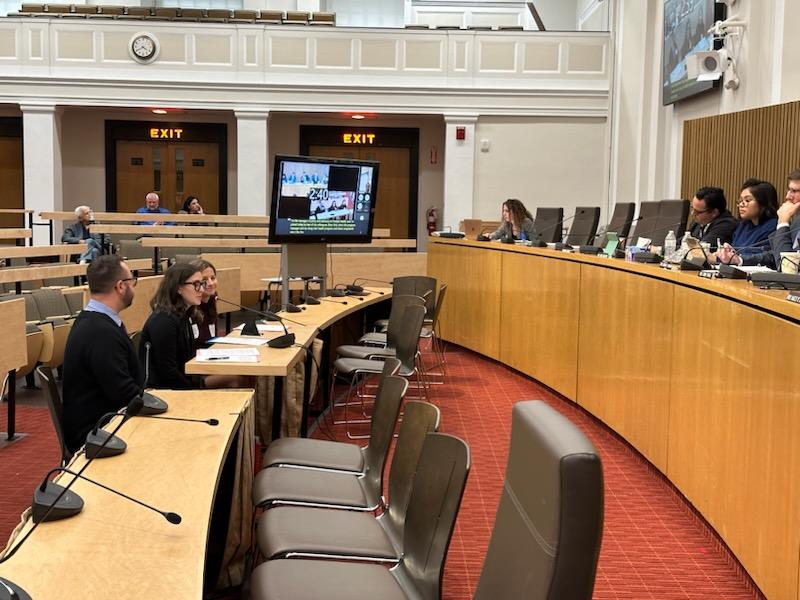Fenway Health staff offered expert testimony in support of legislation to allow cities and towns to establish overdose prevention centers before the Joint Committee on Mental Health, Substance Use and Recovery October 23.
“Overdose prevention centers are proven to work no matter what metric you use,” said Fenway Health Manager of Policy and Advocacy Carrie Richgels. “They keep people alive by preventing overdoses. They also provide access to other healthcare services and programs, including treatment and housing, and they improve public safety in their neighborhoods.”
“An Act relative to preventing overdose deaths and increasing access to treatment” (H. 1981/S. 1242) would create a 10-year pilot program in Massachusetts that would allow cities and towns to create overdose prevention centers. Overdose prevention centers, sometimes called safe consumption sites, are evidence-based, legally sanctioned harm reduction facilities where people who use drugs can safely consume pre-obtained drugs under supervision of trained health care workers. In addition to preventing lethal overdoses, such facilities are designed to reduce the transmission of infectious diseases like HIV and hepatitis, and connect patients with social services, including drug treatment and recovery services.
“An Act relative to preventing overdose deaths and increasing access to treatment” would require the approval of the local board of health to create an overdose prevention center. It would also protect staff and clients from civil and criminal prosecution related to the services they provide and/or receive at the centers.
A recent poll of Massachusetts voters found that 70 percent support passage of the legislation.
“Contrary to popular belief, these centers do not encourage drug use or lead to greater crime,” testified Fenway Health Access: Drug User Health Program Manager Brian Sink. “People who utilize these sites feel more supported and go on to explore treatment options sooner and in greater numbers and with more success for long-term and stable recovery. These sites also help contain the spread of HIV and Hep C among injection drug users which directly impacts the overall public health of the city and state where they operate.”
There are approximately 200 overdose prevention centers operating in 14 countries worldwide. To date, none have experienced an overdose death.
In response to continued increases in overdose fatalities, New York City launched OnPoint in 2021 which runs two overdose prevention centers. In its first year of operation, the program was used by more than 2000 people and reversed 600 overdoses. That same year, Rhode Island lawmakers passed a law to create an overdoes prevention center pilot program. This year, lawmakers in Minnesota approved a law to create a network of “safe recovery sites” that offer harm reduction services including overdose prevention centers. A 2021 study found that an overdose prevention center in Boston would save $4 million in reduced reliance on ambulance services, Emergency Department visits, and hospitalizations.
Fenway Health Director of Prevention Programs Dana Longobardi told lawmakers that Fenway Health’s Access program was a vital source of support for substance users.
“For most of our clients, Access is the one place they can go and think clearly about their drug use. They can speak openly about drugs, make decisions pertaining to the way that they use, test their drugs, and connect with service providers whose primary interest is to support their ability to take charge of their own lives, health, and safety in a way that respects their dignity and autonomy,” Longobardi said. “This effectively removes the chaos that is so often associated with drug use, and with less chaos, the folks that we serve are able to make healthier choices.”
But it’s not nearly enough.
The inability of Access staff to assist clients “during one of the most high-risk situations” — when they are consuming drugs— means that “people are dying,” Longobardi said.
In Massachusetts, six people die each day of opioid overdose. Each death, Longobardi said, could be prevented: “There is zero reason that our friends and neighbors need to be dying from drug-related overdose. We have the evidence. We know the model works.”
“This is a public health crisis,” Richgels added, noting that Fenway Health has supported passage of the bill since it was first filed in 2017. “Since then, we’ve witnessed the overdose deaths of 13,314 people. My heart goes out to everyone here today whose loved ones and friends have died so tragically — and needlessly.”
“An Act relative to preventing overdose deaths and increasing access to treatment” is supported by Massachusetts for Overdose Prevention Centers (MA4OPC). MA4OPC is a statewide coalition of more than 30 organizations committed to establishing overdose prevention centers in Massachusetts. The coalition — including major Massachusetts hospitals and providers, leading medical and public health groups, and nonprofit organizations — supports efforts to save lives, expand harm reduction strategies, and link people to treatment and recovery support services. Fenway Health is a founding member of MA4OPC.
Take action to support this legislation here: MA4OPC Action Alert: Urge the Mental Health and Substance Use Committee to Report Bills H.1981 and S.1242 Out Favorably


